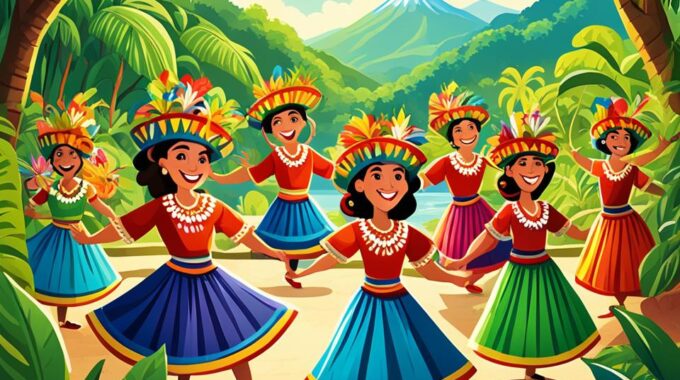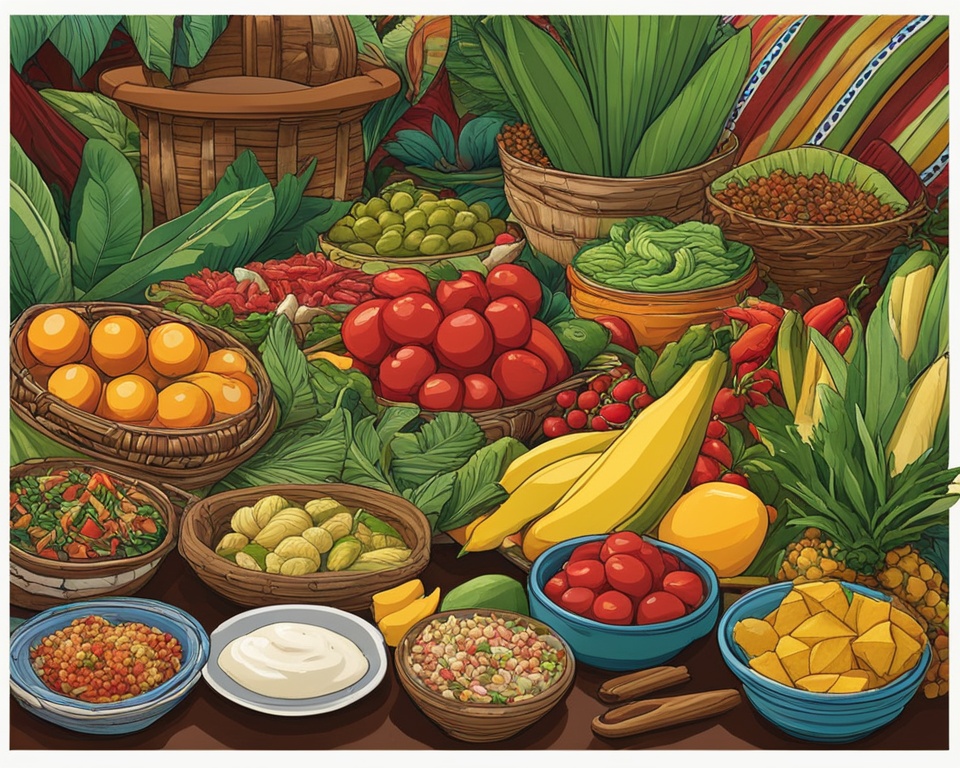GAP Investments provides tailored financing solutions for investors in Costa Rica, understanding the unique needs…

Cultural Norms in Costa Rica: Embrace Local Etiquette
Visiting Costa Rica means understanding its cultural ways. This makes your time there respectful and fun. In Costa Rican society, family is very important. Families are big and live near each other. They often have lots of kids.
The idea of “machismo” is changing. Now, men and women are seen more equally. When you meet someone in Costa Rica, greet them with a strong handshake and eye contact. A smile is friendly. If you know them well, a light cheek kiss is common.
People in Costa Rica are not strict about time. Being a bit late is usually okay. In work, they like face-to-face meetings and getting to know you. Dressing nicely and picking good places to stay are important.
They love gift-giving in Costa Rica. Giving nice, thoughtful gifts is appreciated. To have a good time, respect Costa Rican customs. Avoid fighting and follow their dress code.
Key Takeaways
- Learn about Costa Rican cultural etiquette for a better experience.
- In Costa Rican society, family is key and members are close.
- Greetings involve a strong handshake, eye contact, and sometimes a cheek kiss.
- People here might not be on time, but it’s usually not a big problem.
- Face-to-face meetings are favored, showing the importance of relationships.
Introduction to Costa Rican Cultural Etiquette
Costa Rica is known for its rich culture, traditions, and social customs. To really enjoy the Costa Rican experience, knowing their local customs and etiquettes is key. This includes everything from how they talk and their religious beliefs to what they value.
Learning about Costa Rican culture and traditions not only helps you connect better with locals. It also makes your trip more fun.
The Importance of Understanding Local Customs
In Costa Rica, social etiquette, cultural diversity, and intercultural communication are very important. Getting to know their tico culture and pura vida lifestyle can make your visit much better. You’ll feel closer to the Costa Rican people and their way of life.
Key Aspects of Costa Rican Culture
Understanding cultural values and customs and traditions is essential for a great visit. This guide will help you learn about Costa Rican lifestyle. It will give you the confidence to connect well and be respectful during your trip.
| Cultural Aspect | Key Characteristics |
|---|---|
| Family Values | Importance of extended families, average of 3-5 children per household |
| Gender Roles | Shift towards more equitable relationships, women actively participating in the workforce |
| Punctuality | Being a few minutes late generally accepted, not seen as rude |
| Business Culture | Preference for face-to-face meetings, emphasis on building relationships |
| Gift-Giving | Good quality gifts appreciated, attention to detail important |
| Dress Code | Clean and neat clothing important, particularly in urban areas |
| Accommodation | Staying in reputable, clean, and safe accommodations essential |
Knowing these cultural aspects helps you navigate Costa Rica with respect. It lets you make real connections with the ticos. This improves your travel experience.
Family Values and Gender Roles
Costa Rican society values family highly, with extended families often living close by. They tend to have 3 to 5 children on average, showing the importance placed on family bonds. Though “machismo” is part of tradition, there’s a noticeable shift towards more equitable relationships between men and women. This means women are now active in the workforce, and gender equality is on the rise.
The Significance of Family in Costa Rican Society
In Costa Rica, family holds a significant role, and this even extends legally to relatives beyond the immediate. The culture is known for its insular and clannish family bonds, with traditions that strengthen these ties. The emphasis on collectivism and getting along with others is strong, with most people being Catholic.
Traditional Gender Roles and Evolving Dynamics
Costa Rican society still faces machismo, which contributes to safety issues for women. Yet, there is a push against these problems, with more talks focusing on femicides. Women are actively joining the workforce, and there’s a clear push for gender equality. The country saw its first female president, Laura Chinchilla, elected in 2010.
Greetings and Punctuality
In Costa Rica, saying hello means a firm handshake and looking them in the eye. Add a warm smile too. You might also give a light kiss on the cheek to friends. Being a little late is okay there, though.
Proper Greeting Etiquette in Costa Rica
Costa Rica values greetings that show respect and warmth. This includes a firm handshake, eye contact, and a smile. Don’t be surprised if friends kiss you on the cheek. It’s a sign of how close-knit their family values are.
Unlike strict family values, punctuality isn’t that big in Costa Rica. Missing a social event by few minutes isn’t frowned upon. This easy-going view on being on time is called “Tico Time.” It’s a part of the friendly vibe in Costa Rica.
Business Culture and Meetings
Costa Rica values personal ties and trust in business interactions. People prefer to meet in person to build strong relationships before dealing with business matters. Businesses in Costa Rica are known for their friendly and laid-back approach. They put a lot of importance on being humble and patient.
The Value of Personal Relationships
In Costa Rica, making meaningful connections and earning trust is essential for business. The community there is tight-knit and cares a lot about its reputation. Before agreements, it’s common to have several meetings. They like it when you try to speak their language or understand their culture.
Appearance and Dress Code
Looking professional is crucial in Costa Rica for business meetings. Men often wear dress pants and dress shirts. Women might wear anything from simple pants to elegant dresses. This kind of respect for their traditions and culture is noticed and appreciated.
Meeting Etiquette and Punctuality
Punctuality isn’t always stressed in Costa Rica, but it’s polite to let others know if you’ll be late. Since things can run late, expect some flexibility. It’s also smart to dress nicely and try to speak in ways they understand. Having a local guide for business can truly help with navigating the local scene.
Cultural Norms in Costa Rica
Costa Rican Way of Life: Pura Vida
The Costa Rican way of life is known as “pura vida.” It shows a positive view and a chilled lifestyle. People there value simplicity, thankfulness, and a relaxed vibe. This mindset is very much a part of how they live and their culture. Pura vida teaches Costa Ricans to enjoy each moment. They look at what truly matters, not just at things or social status.
Conservative Dress and Modesty
Costa Rica might seem laid back, especially at the coast. But, a lot of people there hold traditional values. It’s key to dress conservatively when in rural areas or religious spots. This detail shows respect towards the cultural traditions and social customs. Remember this, including at sacred places like churches or temples. Dressing modestly is a way to honor that space.
Public Displays of Affection
In Costa Rica, public displays of affection should not be too much. This is because of the strong Catholic beliefs. Many people prefer not to see this, especially in more traditional areas. It’s vital for visitors to keep physical intimacy in check when out in the open.
Language and Communication
In Costa Rica, it’s key to know about the country’s many languages. The main tongue is Spanish. However, it differs and has its own style called “Tico Spanish.” This arrangement has a unique sound, uses small words, and special words.
The Spanish Dialect in Costa Rica
Tico Spanish shows Costa Rica’s background and who its people are. It’s lively and full of fun words. This way of speaking is really important in connecting with others and fitting in when you’re there.
Indigenous Languages and Linguistic Diversity
Besides Spanish, many indigenous languages are in Costa Rica. They’re spoken by different groups like Maléku and Bribri. These languages show the country’s diverse culture. Learning about them helps you understand more about Costa Rica’s special ways.
Religion, Beliefs, and Cultural Values
In Costa Rica, most people are Roman Catholic, about 65.8%. You can see the impact of their faith in how they value family. This faith also helps keep strong family bonds alive. Yet, you’ll find a mix of beliefs, like Evangelical and Pentecostal Christianity, at 19.8% and 4.1%, respectively. This shows how diverse Costa Rica is when it comes to religion.
The Influence of Catholicism
Since the Spanish colonial times, the Catholic faith has deeply influenced Costa Rica. It’s shaped how the society views family, celebrates religious events, and uses Catholic symbols. These show how much Catholicism has impacted the costa rican way of life.
Religious Diversity and Tolerance
Even though Catholicism is strong in Costa Rica, the country is open to different beliefs. Some people are Protestants, and there are even agnostics and atheists. About 4.9% of Costa Ricans follow other faiths, like indigenous ones. This openness shows the cultural diversity in costa rica and its cultural awareness.
Family, Humility, and Pura Vida Values
Latino family values and the phrase “pura vida” are at the heart of Costa Rican culture. “Pura vida” means “pure life” and promotes a joyful, easy-going lifestyle. Costa Ricans are known for being humble, kind, and helpful, creating a warm and friendly environment. Their approach showcases understanding costa rican culture and the costa rican social behaviors that reflect their nation.
Social Etiquette: Greetings and Gift-Giving
In Costa Rica, how you greet is very important. You should give a firm handshake, look the person in the eye, and smile warmly. A kiss on the cheek might happen if you know the person well. When you’re visiting, bringing a gift is a nice touch. The gift should be good and show you thought about it. Giving the gift with both hands is seen as respectful.
Meeting and Greeting Etiquette
In Costa Rica, greetings are key. A firm handshake, direct eye contact, and a big smile are expected. Women often exchange cheek kisses, and sometimes men do too. This tradition makes conversations start in a friendly and open way.
Gift-Giving Customs
Gifts are a big deal in Costa Rican culture. You should bring one if you’re invited to someone’s house or to a special event. Choose a gift with care and give it with both hands. This shows you value the person.
| Gift-Giving Etiquette in Costa Rica | Suggested Practices |
|---|---|
| Gift Selection | Gifts should be of excellent quality, with a price range up to $50. |
| Presentation | Present the gift with both hands as a sign of respect. |
| Appropriate Occasions | Gifts are commonly exchanged during events like Christmas, birthdays, and Mother’s Day. |
| Cultural Considerations | Avoid giving lilies, as they are associated with funerals in Costa Rica. |
Knowing the social etiquette of greeting and gift-giving in Costa Rica shows respect for local customs. This helps you connect in a meaningful way with the people there.
Dining Etiquette and Culinary Culture
In Costa Rica, knowing the right etiquette is key. Social events start a bit late, so don’t rush. Waiting for the host to eat before you start is a nice gesture. Remember to use good table manners like no elbows on the table or talking with your mouth full. After eating, put your utensils together to show you’re done.
Table Manners and Customs
In Costa Rica, sharing a meal is a big deal. They appreciate the chance to enjoy food together. Often, people show up late to dinners or other events. It’s normal to wait 30 minutes or more for others. This is because Costa Ricans are focused on their relationships and keeping things chill. Always wait for the host before digging in.
Sharing Meals and Expressing Gratitude
At the table, showing respect is important. Keep your elbows off and don’t speak with a full mouth. When you’re done, set your utensils together on your plate. This lets others know you’ve finished. Sharing a meal and saying thanks for the hospitality are big parts of eating in Costa Rica.

Knowing the customs in Costa Rica makes eating there a rich experience. It connects you deeply with the local culture and their delicious food.
Personal Space and Touch
In Costa Rica, showing respect for personal space matters a lot. Always ask before you touch someone, even for a friendly handshake or a pat. The main greeting here is a light handshake or a cheek kiss on the right side for friends. This helps to respect the local culture’s traditions and cultural awareness costa rica.
Respecting Personal Boundaries
Costa Ricans, also known as “Ticos,” are comfortable being close and touch each other more. Yet, it’s important for visitors to remember this and ask before touching anyone, even for a friendly hug. This shows respect for their latino family values and spanish colonial heritage which influence their traditions.
Greetings and Friendly Gestures
The usual greetings here are a light handshake or a kiss on the right cheek among friends. But men usually don’t kiss each other. They either shake hands or give a one-armed hug. Knowing this helps visitors respect and fit in with local costa rican way of life and costa rican social behaviors.
Environmental Consciousness
Costa Rica is famous for its protection of nature and love for eco-tourism. Everyone who visits should think about how they affect the land. This helps keep Costa Rica beautiful and a leader in looking after the environment.
Costa Rica’s Commitment to Eco-Tourism
Costa Rica really cares about eco-tourism, and the numbers prove it. Since 1983, its forests have grown from 26% to 53% of the country. Over 25% of the land is protected, with 30 national parks and lots of natural areas. These places are safe for wildlife and plants.
Sustainable Practices for Visitors
It’s important for visitors to Costa Rica to be green. This means throwing trash away right, recycling, saving water and power, and picking eco-friendly places to stay and visit. Also, it’s key to respect local customs and watch wildlife without disrupting them. Doing these things helps protect Costa Rica’s environment and shows that you care about the local people.
Costa Rica leads in caring for the environment and eco-tourism. By being mindful of social etiquette costa rica and living sustainably, you help protect the country’s natural beauty. This makes Costa Rica a special place in Central America.
Religious Sensitivity and Respect
In Costa Rica, where Catholicism is dominant, religious customs are very important. It is key to dress modestly when you visit places like churches. This means your shoulders and knees should be covered. Also, don’t take photos during religious events. It respects the importance of these moments.
Appropriate Dress for Religious Sites
When visiting Costa Rica’s churches, wear modest clothes. This includes covering your shoulders and knees. This small act shows you respect these holy places. It’s a way of being aware and respectful of local customs.
Photography Etiquette During Ceremonies
It’s not considered polite to photograph during religious ceremonies. These moments are seen as private and sacred. Using a camera can disturb the peace of the occasion. Avoiding photos shows an understanding and respect for the local culture.
Approaching Costa Rica’s religious practices with care is essential. This way, visitors can truly understand the country’s traditions. It helps create a deeper bond with the local people. Your respect is a key part of a memorable and respectful visit to this stunning place.
Additional Tips for Cultural Immersion
To deepen your cultural immersion in Costa Rica, keep these tips in mind. Greet locals with a big smile and a friendly “hola” or “buenos días” to show you care about their cultural traditions. It’s important to engage in small talk. Costa Ricans cherish slow, meaningful conversations. Also, learning a few Spanish words can help a lot. It shows you respect their language.
Greetings and Friendly Interactions
Starting with a simple “hola” or “buenos días” can make a big difference. It sets a friendly tone. Locals will appreciate your warm smile. Being genuinely interested in their cultural practices and customs is important.
Costa Ricans enjoy getting to know people slowly. So, take your time in conversations. Building personal connections is very valued by them.
Learning Basic Spanish
Even though many in Costa Rica speak English, learning Spanish can be very helpful. It’s a great way to connect more deeply. Knowing simple greetings and polite words can make your conversations more meaningful with the local community.
Conclusion
When you act in line with Costa Rica’s culture and manners, your trip becomes better. You can make friends with locals by following their way of doing things. This means valuing family, religion, and the laid-back “pura vida” life.
It’s important to dress right, be polite, and understand their customs. You should give gifts and greet people properly. Doing these things helps you enjoy your time in Costa Rica more. It also respects their ways and values.
Learning how Costa Ricans live and think makes your visit special. You get to know their history and feel their welcoming nature. This leads to a respectful and rich experience in this amazing country.
By following these tips, you not only have a great trip. You also learn to appreciate different cultures more. Living the “pura vida” and making friends there creates memories that last. This is what makes Costa Rica stand out as an amazing place to visit.
FAQ
What are the key cultural norms and etiquette to be aware of when visiting Costa Rica?
Being aware of Costa Rica’s cultural ways is key for a good trip. Families are very important, living near each other and often big. The idea of “machismo” can be felt, but equality between men and women is growing. Saying hi usually means a firm handshake, looking each other in the eyes, and smiling. Friends might kiss you on the cheek. Being late is normal but don’t be rude. For business, meet in person and get to know each other is valued. Dressing nicely and staying in good places matters. Give gifts thoughtfully. Follow their dress code and always be polite.
Why is it important to understand the local customs and etiquette in Costa Rica?
Costa Rica’s culture and ways are deep and meaningful. Knowing how things work helps you blend in and respect locals. It’s about more than just knowing the language and religion. Understanding their everyday values and actions is key to a great trip. By showing you want to fit in, you’ll make friends and have fun.
How important is family in Costa Rican society, and how are gender roles viewed?
Family is everything in Costa Rica, with many children in a house being normal. While “machismo” exists, women work too and things are getting fairer. This shows in many areas of life across the country.
How do Costa Ricans typically greet each other, and what is the attitude towards punctuality?
Costa Ricans greet friends warmly, usually with a handshake and a smile. A kiss on the cheek may follow. They’re not big on being on time. A few minutes late is okay.
What are the key aspects of business culture in Costa Rica?
Business in Costa Rica thrives on relationships. It’s all about personal meetings where people get to know each other. Dress well to make a good impression. Time is flexible, but be respectful. Let others know if you might be late.
What is the “pura vida” lifestyle, and how does it influence cultural norms in Costa Rica?
“Pura vida” is the heart of Costa Ricans’ way of life – simple and joyful. This chill vibe is everywhere, though respect for traditional values remains. Dress modestly and keep public affection low-key to fit in.
What is the linguistic diversity in Costa Rica, and how does it impact communication?
Spanish is the main language but with a local twist called “Tico Spanish”. Indigenous languages are also alive among certain groups. This rich mix adds color to daily talks.
What is the role of religion and cultural values in Costa Rican society?
Roman Catholicism is strong among Costa Ricans. Faith, family, and values like kindness make a friendly and open society. The idea of “pura vida” speaks to their optimistic spirit.
What are the key social etiquette practices in Costa Rica, such as greetings and gift-giving?
Saying hello warmly and giving quality gifts are important in Costa Rica. A hug or a kiss among friends is usual. When giving a gift, show respect with both hands. This is how their social life flourishes.
What are the etiquette practices to keep in mind when dining in Costa Rica?
At meals, show up a bit late and wait for the host to eat first. Table manners like no elbows and not over-talking show respect. After eating, position your utensils in a certain way to show you’re done. Enjoying meals together and being thankful are big parts of eating in Costa Rica.
How important is personal space and touch in Costa Rican culture?
Costa Ricans cherish their personal space. Don’t touch someone without asking first. A light handshake or a kiss on the cheek shows you care. Keeping a respectful distance is a sign of good manners.
What are the eco-tourism practices and environmental considerations in Costa Rica?
Costa Rica is a leader in protecting its green spaces. Visitors should help by being green too. That means recycling, conserving water and energy, and choosing eco-friendly tours. Also, don’t get too close to the wildlife. By doing so, you respect the beautiful land Costa Rica is proud of.
How should visitors approach religious customs and sensitivity when visiting Costa Rica?
In Costa Rica, dressing modestly for religious places shows respect. Don’t take photos during services. Show you understand and respect their faith by your actions.
What are some additional tips for cultural immersion and engagement in Costa Rica?
Want to really get into Costa Rica’s culture? Smile and say “hi” to start. Take it slow with small talk. Learning a bit of Spanish can really help. It’s all about showing you care and are willing to learn.
Source Links
- https://crie.cr/cultural-etiquette-costa-rica/
- https://crie.cr/understanding-costa-ricas-local-customs-and-etiquettes/
- https://www.costarica.com/culture/customs-etiquette
- https://www.commisceo-global.com/resources/country-guides/costa-rica-guide
- https://www.moon.com/travel/planning/men-women-family-in-costa-rica/
- https://incostarica.com/life-in-costa-rica/costa-rican-values-people/
- https://gap.cr/cultural-norms-in-costa-rica/
- https://www.bizlatinhub.com/business-culture-etiquette-costa-rica/
- https://crie.cr/business-culture-in-costa-rica/
- https://gap.cr/business-culture-in-costa-rica/
- https://internationalliving.com/countries/costa-rica/traditions-and-culture-in-costa-rica/
- https://costarica.org/people/culture/
- https://crie.cr/cultural-norms-in-costa-rica/
- https://villafirenzecr.com/ultimate-guide-to-authentic-costa-rican-cuisine/
- https://exploretikizia.com/costa-ricans-love-invading-personal-space/
- https://www.lokaltravel.com/discover/cultural-dos-and-donts-in-costa-rica-tips-for-tourists
- https://ticotimes.net/2023/06/05/celebrating-world-environment-day-costa-ricas-commitment-to-a-cleaner-and-greener-environment
- https://www.good-travel.org/blog/the-people-of-costa-rica-leading-the-way-in-conscious-responsible-travel


